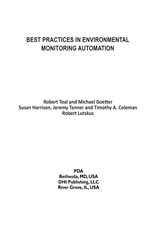Best Practices in Environmental Monitoring Automation (single user digital version)
- Format
- PDF Single user
- Member Price
- $55.00
- Nonmember Price
- $69.00
- Government Price
- $30.00
Please sign in or become a member to purchase items from the PDA bookstore.
This chapter is taken from the book Environmental Monitoring: A Comprehensive Handbook, Volume 3
Environmental Monitoring (EM) programs for pharmaceutical manufacturers are a key part of a comprehensive quality regimen to ensue product safety and efficacy. EM is not optional. Current Good Manufacturing Practice (cGMP) for Finished Pharmaceuticals as defined by the FDA in 21.CFR.211.42 calls for a "system for monitoring environmental conditions" (FDA, 2008). While a good case can be made for a sound EM program for non-sterile products, FDA guidance for sterile products, particularly those produced by aseptic processing, clearly identifies the critical importance of microbiological monitoring including testing of production areas, product components and process water.
This chapter describes key concepts and requirements for introducing automation into the clean room and laboratory environments to enable a more effective quality control program. MODA Technology Partners embraces these automation concepts and has effectively expressed them within its commercial product lines.
Lonza Walkersville, Inc. and ImClone Systems, Inc. have contributed case studies to this chapter discussing their experiences with the introduction of these concepts via deployment of the MODA-EM&™ product at their manufacturing facilities.
Available to download. Prior to purchase please view the download instructions and Terms of Usage.
Format: Digital PDF (1 file - 6.73 MB)
Table of Contents
Table of Contents:
About the Authors
About the Authors
Robert Toal, VP of
Marketing and Business Development at MODA Technology Partners, is an
experienced industry professional with over 25 years spent in information
technology solutions development and integration. Mr. Toal has spent the last 10
years of his career with specific focus in regulated, automated manufacturing
applications in the biopharmaceutical sector. Mr. Toal has worked extensively
with automated solutions in life sciences for content management, corrective and
preventative action (CAPA), training, laboratory analytics, and environmental
monitoring. Mr. Toal has a Bachelor of Science in Industrial Engineering from
Lehigh University and a Masters of Engineering in Computer Science from Penn
State University.
Michael Goetter, VP of Product Strategy at MODA Technology Partners, has over 15 years experience in product development and quality systems implementations for clients in the pharmaceutical and biotechnology industries. Previously, he was Executive Vice President and co-founder of The Syncamore Group. He is a member of the Technical Advisory Committee of Ben Franklin Technology Partners, the Society of Information Management, and is a contributor to the ASTM standard for Laboratory Information Management Systems. Mr. Goetter received his Bachelor of Arts degree from La Salle University.
Susan Harrison is the Senior Manager, QC Microbiology at Lonza Walkersville, Inc. She has 17 years of experience in the pharmaceutical and biopharmaceutical industries, holding positions at Medimmune, Amgen, Dey, L.P., and GC Hanford. She also worked in the Public Health sector as a Clinical Microbiologist. She has a BA in Biology from Syracuse University and is certified as a Technologist in Microbiology by the American Society for Clinical Pathology.
Jeremy Tanner has over two years experience in the biotechnology industry at Lonza Walkersville Inc, working in the microbiology department then as a QC Information Systems Specialist. He received two Bachelors degrees in Microbiology and Integrated Science and Technology at Marshall University.
Timothy A. Coleman, Ph.D. has more than 15 years experience in biotechnology and biopharmaceutical organizations including Human Genome Sciences (HGS), Correlogic Systems Inc, and Lonza Walkersville Inc. He received his doctorate degree in Cellular and Molecular Biology from Ohio University and completed his post-doctoral training at the Roche Institute of Molecular Biology. He has published 39 articles and is PI or Co-PI on more than 20 issued patents.
Robert Lutskus has been with ImClone Systems Inc. since 2005 in the Quality Control Microbiology department where he is responsible for the validation and administration of all computerized microbiology instrumentation. He is an integral part of the cross functional team between the Quality Control and Information Technologies departments, supporting daily activities and special projects. He holds a B.A. degree from the University of Delaware in Biological Sciences.

